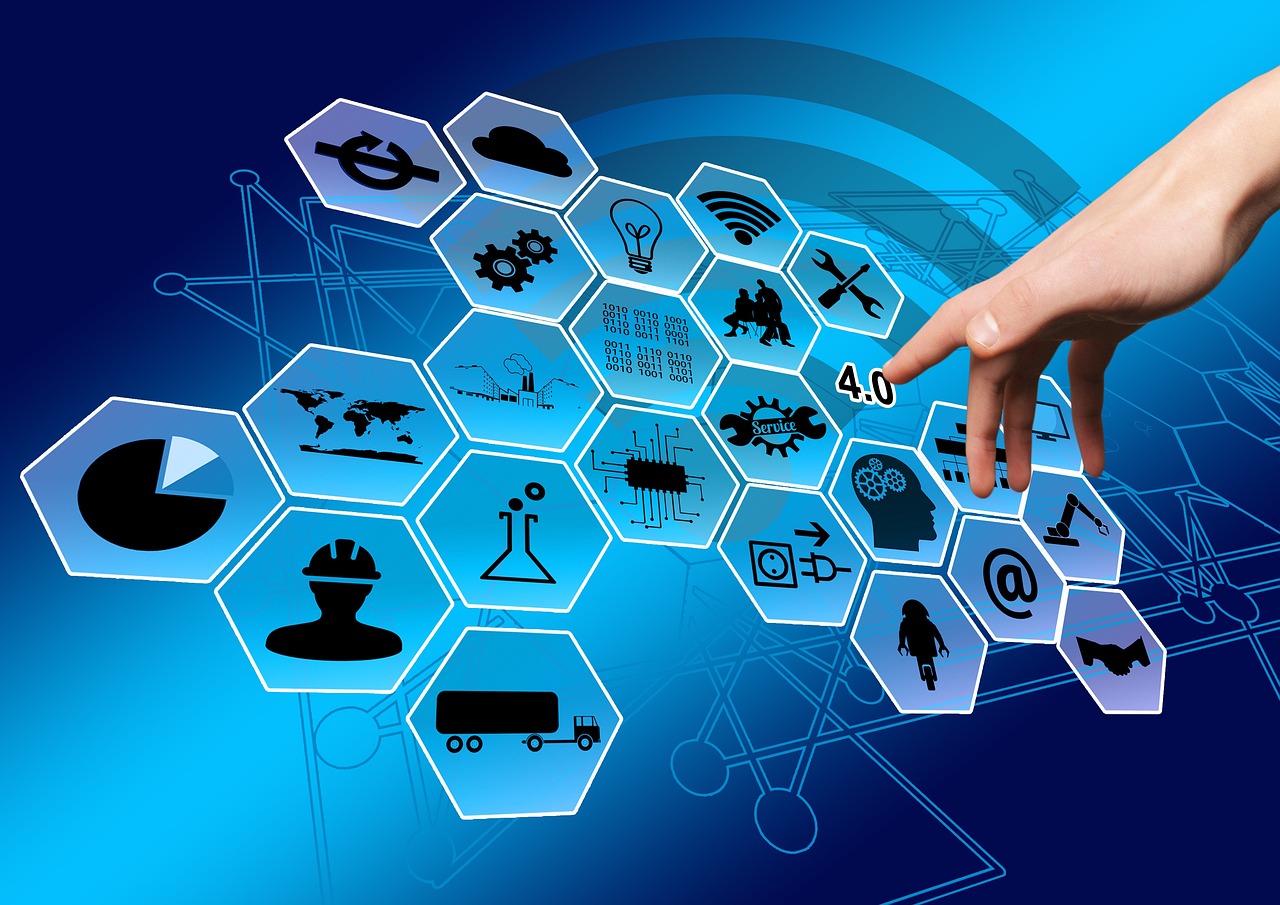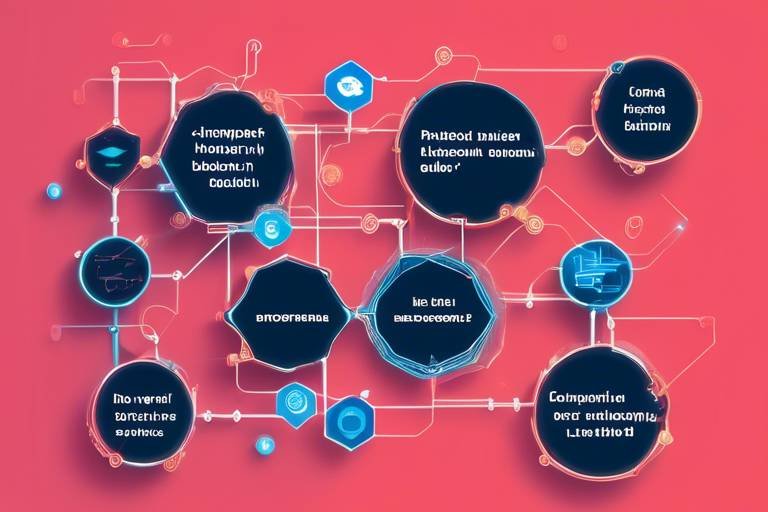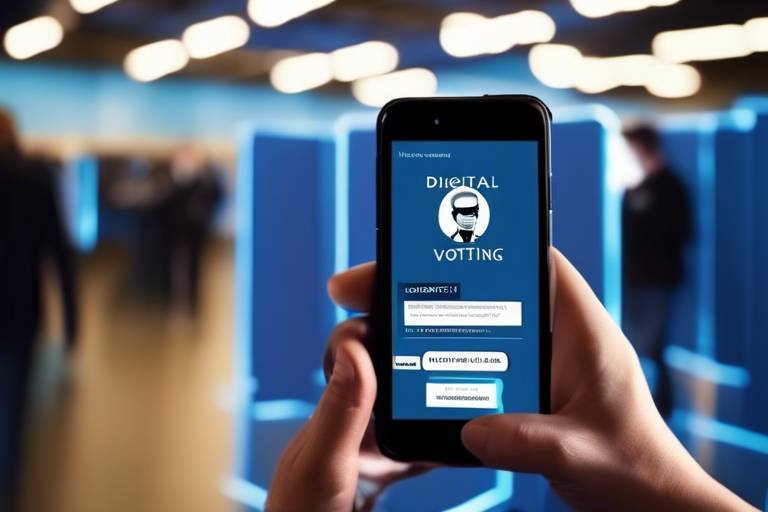How Blockchain is Transforming Customer Relationship Management
In today's fast-paced digital world, businesses are constantly seeking innovative ways to enhance their customer relationship management (CRM) strategies. One of the most groundbreaking technologies making waves in this arena is blockchain. Imagine a world where every transaction is not only secure but also transparent, where customers have complete control over their data, and businesses can build trust like never before. This article delves into how blockchain is reshaping the landscape of CRM, paving the way for a more interactive and secure relationship between brands and their customers.
Blockchain technology operates on the principle of a decentralized ledger system, which allows for secure and transparent transactions among parties without the need for a middleman. This means that every transaction is recorded in a way that is visible to all authorized parties, yet cannot be altered or tampered with. Think of it as a digital notary that verifies every agreement, ensuring that both businesses and customers can trust the information being shared.
The implications of this technology for CRM are profound. By implementing blockchain, companies can enhance data security, improve customer trust, and streamline processes that lead to greater customer satisfaction and loyalty. But what does this really mean for businesses and their customers? Let's explore the myriad benefits of integrating blockchain into CRM systems.
At its core, blockchain is a digital ledger that records transactions across many computers in such a way that the registered transactions cannot be altered retroactively. This decentralization not only enhances security but also promotes transparency, as all parties involved can access the same information in real-time. Picture it like a shared Google Doc where everyone can see the edits made, but no one can erase the history of changes. This creates a robust framework for businesses to build trustworthy relationships with their customers.
When it comes to CRM, the benefits of blockchain are numerous and impactful. Here are some key advantages:
- Data Security and Privacy: Blockchain enhances data security through encryption and immutable records, significantly reducing the risk of data breaches.
- Decentralization and Control: Customers gain greater control over their personal data, fostering a sense of trust and empowerment.
- Immutable Records: The tamper-proof nature of blockchain ensures that transaction histories are reliable and verifiable.
One of the most significant challenges businesses face today is ensuring the security and privacy of customer data. With increasing incidents of data breaches making headlines, customers are understandably wary. Blockchain technology addresses these concerns head-on. By utilizing advanced encryption techniques, blockchain ensures that sensitive information remains secure. Moreover, the immutable nature of blockchain records means that once data is entered, it cannot be changed or deleted, providing a reliable source of truth for both customers and businesses alike.
Decentralization is a game-changer in the world of CRM. Traditionally, companies hold vast amounts of customer data, often leading to trust issues. However, with blockchain, customers can control their own data. Imagine being able to choose what information you share and with whom, all while knowing that your data is protected from unauthorized access. This shift empowers customers and fosters a deeper level of trust between them and businesses.
In a world where misinformation can spread like wildfire, having a reliable source of truth is invaluable. Blockchain's immutable records ensure that transaction histories are tamper-proof. This means that any agreements made or transactions completed are securely logged and can be referenced at any time. For businesses, this provides a clear audit trail, while customers can rest assured knowing their interactions are securely documented.
Blockchain isn't just about security; it's also about creating more engaging customer experiences. By leveraging smart contracts, businesses can automate processes and create personalized loyalty programs that resonate with their customers. Imagine receiving tailored offers based on your purchasing history, all while knowing your data is secure and used responsibly. This level of personalization can significantly enhance customer engagement and satisfaction.
Several companies have already begun implementing blockchain technology in their CRM systems, reaping the benefits firsthand. For example, companies in the retail sector are utilizing blockchain to track customer feedback and preferences in real-time, allowing them to adjust their offerings promptly. In finance, institutions are using blockchain to streamline transactions and enhance customer trust through transparent processes.
Different industries are harnessing the power of blockchain to tailor their CRM strategies to meet specific customer needs. For instance:
- Retail: Blockchain helps in tracking product authenticity and customer preferences.
- Finance: It streamlines transactions and increases transparency.
- Healthcare: It secures patient records and enhances trust in data sharing.
Companies that have adopted blockchain in their CRM strategies have learned valuable lessons along the way. Challenges such as integration with existing systems and educating customers about the technology are common. However, by strategically addressing these obstacles, businesses can successfully implement blockchain and enjoy its myriad benefits.
As we look to the future, the trajectory of blockchain in customer relationship management appears promising. Emerging trends suggest that more businesses will adopt this technology, enhancing their CRM strategies and customer interactions. However, potential challenges remain, such as regulatory hurdles and the need for widespread education on blockchain. Businesses that stay ahead of these trends and prepare for the evolving landscape will undoubtedly gain a competitive edge in the marketplace.
Q: What is blockchain technology?
A: Blockchain is a decentralized digital ledger that securely records transactions across multiple computers, ensuring transparency and security.
Q: How does blockchain enhance customer trust?
A: By allowing customers greater control over their data and providing immutable records of transactions, blockchain fosters a more trustworthy relationship between businesses and consumers.
Q: Can blockchain improve customer engagement?
A: Yes! Blockchain enables personalized experiences through smart contracts and loyalty programs, making interactions more engaging for customers.
Q: What industries are using blockchain for CRM?
A: Industries such as retail, finance, and healthcare are leveraging blockchain technology to enhance their CRM strategies.

Understanding Blockchain Technology
Blockchain technology is often hailed as a revolutionary advancement in the digital age, and for good reason. At its core, blockchain is a decentralized ledger system that enables secure and transparent transactions between parties without the need for intermediaries. Imagine a digital notebook that everyone can see, but no one can erase or alter. This is the essence of blockchain: a shared record that is immutable and accessible to all authorized participants.
To better grasp how blockchain operates, it's essential to understand its fundamental principles. The technology comprises a series of blocks that are linked together in a chronological chain. Each block contains a list of transactions, a timestamp, and a unique cryptographic hash of the previous block. This structure not only secures the data but also ensures that any attempt to modify a block would require changing all subsequent blocks, making fraud nearly impossible.
One of the most exciting aspects of blockchain is its decentralization. Unlike traditional databases that are controlled by a single entity, a blockchain is maintained by a network of computers (or nodes) that validate and record transactions. This means that no single party has complete control over the entire system, which significantly reduces the risk of data tampering and enhances trust among users.
Moreover, blockchain employs advanced encryption techniques to protect sensitive information. Each transaction is encrypted and linked to the previous one, creating a secure chain of data that is accessible yet protected. This level of security is crucial in a world where data breaches are all too common, and businesses must prioritize customer privacy.
In addition to enhancing security, blockchain technology fosters transparency. Every transaction recorded on the blockchain is visible to all participants in the network. This transparency builds trust, as customers can independently verify the authenticity of transactions and the integrity of the businesses they engage with. For instance, in industries like supply chain management, blockchain can provide consumers with real-time tracking information, ensuring that products are sourced ethically and delivered as promised.
In summary, understanding blockchain technology is crucial for grasping its potential impact on various sectors, including customer relationship management. Its decentralized nature, robust security measures, and transparency features create a solid foundation for enhancing customer trust and engagement. As businesses begin to explore the possibilities of blockchain, they will find that it not only protects their data but also empowers their customers in unprecedented ways.

Benefits of Blockchain in CRM
When we think about the modern business landscape, it's clear that trust and transparency have become the cornerstones of successful customer relationships. Enter blockchain technology, a game-changer that is revolutionizing customer relationship management (CRM) in ways we never thought possible. Imagine a world where every transaction is secure, every piece of data is encrypted, and customers have complete control over their information. Sounds like a dream, right? Well, with blockchain, this dream is becoming a reality.
One of the most significant benefits of blockchain in CRM is its ability to enhance data security. Traditional databases are often vulnerable to hacking and data breaches, which can lead to significant financial losses and damage to a company's reputation. However, blockchain operates on a decentralized ledger system, meaning that data is distributed across a network of computers rather than stored in a single location. This decentralization makes it incredibly difficult for hackers to manipulate or steal sensitive information. In fact, a study by IBM found that businesses that implement blockchain technology can reduce fraud by up to 80%!
Furthermore, blockchain enhances customer trust. In an age where consumers are increasingly concerned about their privacy and data security, businesses that leverage blockchain can offer unparalleled transparency. Customers can verify their transactions and see exactly how their data is being used, which fosters a sense of trust and loyalty. This level of transparency is something that traditional CRM systems struggle to provide, often leaving customers in the dark about how their information is handled.
Another noteworthy advantage of blockchain is the creation of immutable records. Once a transaction is recorded on the blockchain, it cannot be altered or deleted. This feature is crucial for businesses that need to maintain accurate and reliable records of customer interactions. Imagine a scenario where a customer disputes a transaction; with blockchain, both the customer and the business can refer to an immutable record that serves as a definitive proof of the transaction. This not only saves time but also reduces the potential for conflict, enhancing overall customer satisfaction.
Additionally, blockchain technology can streamline various processes within CRM systems. For instance, consider the implementation of smart contracts. These are self-executing contracts with the terms of the agreement directly written into code. This means that once conditions are met, the contract automatically executes without the need for intermediaries. This not only speeds up transactions but also reduces costs associated with manual processing. By automating these processes, businesses can focus more on building relationships with their customers rather than getting bogged down in administrative tasks.
Moreover, blockchain can facilitate more personalized customer experiences. By utilizing customer data securely stored on the blockchain, businesses can tailor their marketing strategies to meet the specific needs and preferences of individual consumers. This level of personalization can significantly improve customer engagement and satisfaction. Imagine receiving a personalized offer based on your previous purchases that feels like it was crafted just for you—this is the power of blockchain in CRM.
In summary, the benefits of integrating blockchain into CRM systems are vast and varied. From enhanced data security and customer trust to immutable records and streamlined processes, blockchain technology is paving the way for a new era of customer relationship management. As businesses continue to explore the potential of this technology, we can expect to see a significant shift in how companies interact with their customers, ultimately leading to stronger relationships and increased loyalty.
- What is blockchain technology? Blockchain is a decentralized digital ledger that records transactions across multiple computers securely and transparently.
- How does blockchain enhance data security? By distributing data across a network, blockchain reduces the risk of hacking and data breaches, making it more secure than traditional databases.
- Can blockchain improve customer trust? Yes, blockchain provides transparency in transactions, allowing customers to verify how their data is used, which fosters trust.
- What are smart contracts? Smart contracts are self-executing contracts with the terms written into code, allowing for automatic execution without intermediaries.
- How can businesses personalize customer experiences using blockchain? By securely storing customer data on the blockchain, businesses can tailor marketing strategies to individual preferences, enhancing engagement.

Data Security and Privacy
In today's digital age, where data breaches and privacy concerns are rampant, data security has become a top priority for both businesses and consumers. Blockchain technology stands out as a beacon of hope in this landscape, providing innovative solutions to protect sensitive information. Imagine a world where your personal data is not only secure but also under your control—this is the promise of blockchain.
At its core, blockchain operates as a decentralized ledger, meaning that no single entity has control over the entire database. This decentralization significantly reduces the risk of a single point of failure, which is often the target in traditional data breaches. With blockchain, every transaction is recorded in a block and linked to the previous one, creating a chain of information that is immutable. This means that once data is entered, it cannot be altered or deleted, ensuring a reliable history of transactions.
One of the most compelling aspects of blockchain is its use of encryption. Each piece of information is encrypted and stored across a network of computers, making unauthorized access nearly impossible. For instance, when a customer makes a purchase, their personal details are not stored on a central server but are instead encrypted and distributed across the blockchain. This not only protects the data but also gives customers peace of mind, knowing their information is safe from prying eyes.
Moreover, blockchain empowers customers by offering them greater control over their data. Instead of businesses owning the data, customers can choose what information they want to share and with whom. This shift in data ownership fosters a sense of trust between businesses and consumers, as customers feel more secure knowing they have the power to manage their personal information. This relationship is vital, especially in industries where trust is paramount, such as finance and healthcare.
To illustrate the importance of data security and privacy in blockchain, consider the following table, which highlights key benefits:
| Benefit | Description |
|---|---|
| Enhanced Security | Data is encrypted and stored across a decentralized network, minimizing breach risks. |
| Data Ownership | Customers have control over their information, deciding what to share. |
| Transparency | Immutable records provide a clear history of transactions, building trust. |
| Reduced Fraud | Immutable records make it difficult to alter or forge transaction data. |
As we delve deeper into the world of blockchain, it's clear that its potential to enhance data security and privacy is just beginning to be realized. With the ongoing evolution of technology, businesses that adopt blockchain will not only protect their customers but also build lasting relationships based on trust and transparency. After all, in a world where data is the new currency, safeguarding it is paramount.
- What is blockchain technology? Blockchain is a decentralized digital ledger that securely records transactions across multiple computers.
- How does blockchain enhance data security? It uses encryption and decentralization to protect data from unauthorized access and breaches.
- Can customers control their data on a blockchain? Yes, blockchain empowers customers to manage their personal information and decide what to share.
- What industries can benefit from blockchain? Industries like finance, healthcare, and retail are leveraging blockchain for improved data security and customer trust.

Decentralization and Control
Decentralization is one of the most compelling aspects of blockchain technology, and it fundamentally changes the way customers interact with businesses. Imagine a world where your personal data is not stored in a single, vulnerable database but instead distributed across a network of computers. This is the essence of decentralization in blockchain. It empowers customers by giving them greater control over their own data, allowing them to decide who accesses their information and how it's used. In traditional systems, data is often hoarded by companies, creating a power imbalance that can lead to mistrust. With blockchain, customers can feel more secure knowing that they have a say in their own data management.
Moreover, this control fosters a more transparent relationship between businesses and their clients. For instance, when a customer makes a purchase, they can track their transaction in real-time on the blockchain. This not only increases transparency but also builds trust. Customers are more likely to engage with brands that respect their privacy and give them control over their personal information. It's like having a safe deposit box for your data, where only you hold the key.
To illustrate the impact of decentralization, consider the following key points:
- Empowerment: Customers can manage their own data, reducing reliance on intermediaries.
- Trust: Transparency reduces the fear of data misuse, enhancing customer loyalty.
- Privacy: Customers can choose what information to share, leading to tailored experiences.
Additionally, the decentralized nature of blockchain means that there is no single point of failure. This drastically reduces the risk of data breaches, which are all too common in centralized systems. For example, if a company's database is hacked, sensitive customer information can be compromised. However, in a decentralized environment, even if one node is attacked, the overall integrity of the system remains intact. This resilience not only protects customers but also reinforces their trust in the brand.
In conclusion, decentralization in blockchain technology is not just a technical advancement; it is a paradigm shift that reshapes the customer-business relationship. By putting control back into the hands of customers, businesses can cultivate a more engaged, loyal, and trusting customer base. As we move forward, understanding and leveraging this decentralization will be crucial for companies aiming to thrive in an increasingly digital world.
- What is decentralization in blockchain? Decentralization in blockchain refers to the distribution of data across a network, allowing users to have control over their own information without relying on a central authority.
- How does decentralization enhance customer trust? By allowing customers to manage their own data and providing transparency in transactions, decentralization fosters a trusting relationship between customers and businesses.
- Are there any risks associated with decentralization? While decentralization offers many benefits, it can also pose challenges in terms of data management and compliance. However, the overall security benefits often outweigh these risks.

Immutable Records
When we talk about in the context of blockchain technology, we are diving into one of its most powerful features. Imagine a digital ledger that acts like a diary, where every entry is not only written in ink but also locked away in a vault that cannot be tampered with. This is the essence of blockchain’s immutability. Once a transaction is recorded on the blockchain, it becomes a permanent part of the ledger, and altering it is virtually impossible. This characteristic is crucial for businesses, especially when it comes to maintaining trust with their customers.
Why is this so important? In today’s digital age, data breaches and fraud are rampant. Customers want to know that their information is safe, and businesses need to demonstrate that they can protect sensitive data. With immutable records, businesses can assure their clients that once their data is recorded, it cannot be altered or deleted without consensus from the network. This not only enhances transparency but also builds a foundation of trust between the business and its customers.
To further understand the significance of immutable records, let’s consider a few key points:
- Accountability: Every transaction is recorded with a timestamp and the identity of the parties involved, making it easier to track and audit.
- Fraud Prevention: The difficulty in altering records deters fraudulent activities, ensuring that the information remains reliable.
- Reliability: Businesses can rely on the accuracy of the data stored on the blockchain, which is essential for decision-making and strategic planning.
Moreover, immutable records serve as a single source of truth. In traditional databases, discrepancies can arise due to human error, system failures, or malicious intent. However, blockchain technology eliminates these issues by creating a consensus mechanism where all parties must agree before any transaction is finalized. This not only reduces errors but also fosters a collaborative environment where all stakeholders can trust the data they are working with.
As we look towards the future, the role of immutable records in customer relationship management will only become more vital. Businesses that leverage this technology will not only enhance their operational efficiency but also cultivate deeper relationships with their customers. The ability to provide verifiable and unchangeable records of transactions will undoubtedly lead to improved customer satisfaction and loyalty. In a world where trust is paramount, immutable records are the key to unlocking a new era of business integrity.
- What are immutable records?
Immutable records refer to data entries that cannot be altered or deleted once they are added to the blockchain ledger. - How do immutable records enhance security?
They prevent unauthorized changes and provide a verifiable history of all transactions, reducing the risk of fraud and data tampering. - Can immutable records be deleted?
No, once a record is added to the blockchain, it is permanent and cannot be deleted or changed without consensus from the network. - What industries can benefit from immutable records?
Industries such as finance, healthcare, and supply chain management can greatly benefit from the transparency and security provided by immutable records.

Enhanced Customer Engagement
In the ever-evolving landscape of customer relationship management, is becoming a crucial factor for businesses aiming to thrive. Imagine a world where every interaction with a brand feels personal, where customers feel valued and understood. This is where blockchain technology steps in, revolutionizing the way companies engage with their customers. By leveraging the unique capabilities of blockchain, businesses can create experiences that are not only interactive but also deeply personalized.
One of the standout features of blockchain is its ability to facilitate smart contracts. These self-executing contracts with the terms of the agreement directly written into code can automate transactions and interactions between businesses and customers. For example, a customer might enroll in a loyalty program through a smart contract that automatically rewards them for their purchases. This not only streamlines the process but also enhances the customer experience by ensuring that rewards are distributed fairly and transparently.
Additionally, blockchain enables businesses to gather and analyze customer data in a way that respects privacy and builds trust. Customers are increasingly concerned about how their data is used, and blockchain provides a solution by allowing them to control their own information. This means that businesses can engage with customers more meaningfully, offering personalized recommendations and services based on consented data. Imagine receiving tailored offers that truly match your preferences, all while knowing your data is secure and not being misused.
Moreover, the transparency offered by blockchain can significantly enhance customer trust. When customers can see the entire journey of a product—from production to sale—they feel more connected to the brand. This level of transparency fosters a sense of loyalty, as customers appreciate knowing that their chosen brands are committed to ethical practices. For instance, in the food industry, customers can trace the origin of their food products, ensuring they make informed choices that align with their values.
To illustrate the impact of blockchain on customer engagement, consider the following table that summarizes key benefits:
| Benefit | Description |
|---|---|
| Smart Contracts | Automates transactions and rewards, enhancing customer experiences. |
| Data Control | Empowers customers to manage their own data, fostering trust. |
| Transparency | Provides visibility into product journeys, building brand loyalty. |
In conclusion, the integration of blockchain technology into customer relationship management is not just a trend; it’s a transformative shift that can lead to deeper customer connections. As businesses continue to adopt these innovative solutions, the potential for enhanced customer engagement is limitless. By embracing blockchain, companies can not only meet but exceed customer expectations, creating a win-win scenario that benefits both parties.
- What is blockchain technology? Blockchain is a decentralized digital ledger that records transactions across many computers securely and transparently.
- How does blockchain enhance customer engagement? It allows for personalized interactions through smart contracts and gives customers control over their data.
- Can blockchain improve trust between customers and businesses? Yes, by providing transparency in transactions and ensuring data security, blockchain fosters greater trust.
- Are there industries that benefit more from blockchain in CRM? Industries like retail, finance, and healthcare are leveraging blockchain for enhanced customer relationship strategies.

Case Studies of Blockchain in CRM
In the ever-evolving landscape of technology, blockchain has emerged as a game-changer for customer relationship management (CRM). Various companies across different industries have started to harness the power of this innovative technology, leading to remarkable transformations in how they interact with their customers. Let’s delve into some notable case studies that illustrate the practical applications of blockchain in CRM and the impressive outcomes that have followed.
One standout example is Everledger, a company that uses blockchain to create a digital ledger for diamonds. This initiative not only ensures the authenticity of the diamonds but also provides a transparent history of each stone. By leveraging blockchain, Everledger enhances customer trust and engagement, as buyers can access detailed information about the diamond’s provenance. This transparency fosters a stronger connection between the brand and its customers, ultimately leading to increased loyalty.
Another significant case is the collaboration between Walmart and IBM to track food products using blockchain technology. This initiative allows Walmart to trace the origin of food items in seconds, significantly reducing the time it takes to identify sources of contamination during food recalls. By implementing this system, Walmart not only improves its operational efficiency but also assures customers of the safety and quality of their food, thus enhancing customer satisfaction. The result? A more engaged and trusting customer base.
The healthcare industry is also witnessing the benefits of blockchain in CRM. For instance, Chronicled, a company focused on supply chain solutions in pharmaceuticals, utilizes blockchain to manage and verify the authenticity of drugs. This technology enables healthcare providers to ensure that patients receive genuine medications, while also giving patients control over their medical data. The impact on customer engagement is profound, as patients feel empowered and secure in their healthcare choices.
These case studies illustrate that blockchain is not just a buzzword; it is a transformative technology that can significantly enhance CRM practices. Companies leveraging blockchain can provide their customers with a sense of security, transparency, and engagement that was previously unattainable. However, the journey is not without challenges. Businesses must navigate technical complexities and ensure that their staff is adequately trained to utilize these systems effectively.
To summarize, the integration of blockchain into CRM strategies is reshaping how businesses interact with their customers. As we look to the future, it is clear that those who embrace this technology will likely stand out in a competitive market. The key takeaway here is that blockchain can serve as a powerful tool for building stronger relationships with customers, fostering trust, and ultimately driving loyalty.
- What is blockchain technology?
Blockchain is a decentralized digital ledger that records transactions across multiple computers securely, ensuring that the recorded information cannot be altered retroactively. - How does blockchain improve customer trust?
By providing transparent and immutable records of transactions, customers can verify the authenticity of products and services, enhancing their trust in the brand. - Can blockchain be used in any industry?
Yes, blockchain technology can be applied across various industries, including finance, healthcare, retail, and logistics, to improve transparency and efficiency in CRM. - What are the challenges of implementing blockchain in CRM?
Some challenges include technical complexity, the need for employee training, and the integration of blockchain with existing systems.

Industry-Specific Applications
When it comes to the application of blockchain technology in customer relationship management (CRM), different industries are finding unique ways to harness its power. Imagine a world where every transaction is not just recorded but also verified by a network of computers, making it incredibly hard to tamper with. This is the promise of blockchain, and it's being embraced across various sectors, each tailoring its implementation to meet specific customer needs and operational challenges.
In the retail sector, for instance, brands are utilizing blockchain to enhance transparency in their supply chains. Customers can trace the origin of their products, ensuring they are buying ethically sourced items. This level of transparency not only builds trust but also strengthens customer loyalty. Imagine walking into a store and knowing exactly where your food came from, or how your clothes were made—this is the future that blockchain promises.
Moving on to the finance industry, blockchain is revolutionizing how banks and financial institutions manage customer data and transactions. With its ability to create immutable records, financial organizations can offer customers a secure and transparent way to manage their accounts. For example, smart contracts can automate loan agreements, ensuring that conditions are met before funds are released, which reduces the risk of fraud and enhances customer satisfaction.
In the healthcare sector, blockchain is being leveraged to protect patient data while improving accessibility. Imagine a scenario where your medical records are securely stored on a blockchain, allowing only authorized personnel to access them. This not only safeguards your privacy but also ensures that healthcare providers have the most accurate and up-to-date information when treating you. Patients can have peace of mind knowing that their sensitive information is protected against breaches, while doctors can deliver better care through quick access to reliable data.
Furthermore, the real estate industry is also tapping into blockchain to streamline property transactions. By using blockchain, buyers and sellers can engage in transactions without the need for intermediaries like title companies, which often slow down the process. This not only speeds up the buying and selling process but also reduces costs associated with property transactions. Imagine being able to buy a house with just a few clicks, all securely recorded on a blockchain—this is becoming a reality.
In summary, the applications of blockchain in CRM are as diverse as the industries themselves. Each sector is finding innovative ways to improve customer relationships, enhance transparency, and build trust. As companies continue to explore these possibilities, we can expect to see even more tailored solutions that address industry-specific challenges while fostering deeper connections with customers.
- How does blockchain enhance customer trust?
Blockchain provides transparency and security, allowing customers to verify transactions and ensuring their data is protected. - Can blockchain be integrated into existing CRM systems?
Yes, many companies are developing solutions that allow for seamless integration of blockchain technology into current CRM frameworks. - What are some challenges of implementing blockchain in CRM?
Challenges include the need for technology upgrades, training staff, and ensuring compliance with regulations.

Lessons Learned from Implementations
As businesses dive into the world of blockchain for customer relationship management (CRM), they often encounter a myriad of challenges and triumphs that shape their journey. One of the most significant lessons learned is the importance of thorough planning and strategy development. Companies that rushed into implementation without a clear roadmap often found themselves grappling with integration issues and employee resistance. A well-defined strategy not only streamlines the process but also helps in aligning the technology with business objectives.
Another critical takeaway is the need for cross-departmental collaboration. Blockchain technology impacts various facets of an organization, from IT to customer service. Successful implementations often involved teams working together to ensure that the blockchain solution addressed the needs of all stakeholders. For instance, a retail company that integrated blockchain into its CRM system found that involving marketing and sales teams early on led to a more user-friendly interface that customers loved.
Moreover, businesses learned the value of customer education and engagement. When customers understand how their data is being used and the benefits of blockchain—like enhanced security and transparency—they are more likely to embrace the technology. One financial institution that adopted blockchain for its CRM reported that hosting informational webinars helped demystify the technology, resulting in higher customer satisfaction and trust.
In terms of technical challenges, many organizations faced hurdles related to scalability and interoperability. Companies that invested in modular solutions that could easily integrate with existing systems had a smoother transition. A notable example is a healthcare provider that implemented a blockchain solution for patient data management. By choosing a scalable platform, they were able to expand their use of blockchain technology without overhauling their entire infrastructure.
Finally, the importance of continuous monitoring and adaptation cannot be overstated. The blockchain landscape is ever-evolving, and businesses must stay agile. Companies that established feedback loops and regularly assessed their blockchain systems were able to adapt to new regulations and customer expectations swiftly. This adaptability not only improved their CRM processes but also positioned them as leaders in innovation within their industries.
- What is blockchain technology? Blockchain is a decentralized ledger system that records transactions across many computers securely, ensuring that the records cannot be altered retroactively.
- How does blockchain improve data security in CRM? By using encryption and immutable records, blockchain enhances data security, making it difficult for unauthorized parties to access or alter sensitive information.
- Can blockchain be integrated with existing CRM systems? Yes, many blockchain solutions are designed to be modular and can be integrated with existing systems, allowing for a smoother transition.
- What industries can benefit from blockchain in CRM? Industries like retail, finance, and healthcare are leveraging blockchain to enhance their CRM strategies, improving customer engagement and trust.

The Future of Blockchain in CRM
The future of blockchain in customer relationship management (CRM) is not just a fleeting trend; it’s a **game-changer** that promises to redefine how businesses interact with their customers. As we look ahead, several key trends and possibilities emerge that could significantly shape the CRM landscape. One of the most exciting aspects is the potential for **greater personalization**. Imagine a world where every interaction with a brand feels uniquely tailored to your preferences and behaviors. Blockchain can facilitate this by securely storing customer data in a way that allows businesses to access and analyze it without compromising privacy. This means brands can offer personalized recommendations and services that resonate with individual customers.
Moreover, the integration of **artificial intelligence (AI)** with blockchain technology is set to enhance CRM systems further. By combining these two powerful technologies, businesses can analyze vast amounts of data in real-time, gaining insights that were previously unimaginable. For instance, AI algorithms can predict customer behaviors based on blockchain-stored data, allowing companies to proactively address customer needs and concerns before they even arise. This level of responsiveness not only improves customer satisfaction but also fosters a deeper sense of loyalty.
However, with great potential comes great responsibility. The **challenges** associated with implementing blockchain in CRM are not to be overlooked. Issues such as scalability, regulatory compliance, and the need for a cultural shift within organizations pose significant hurdles. Businesses will need to invest in education and training to ensure their teams are equipped to leverage this technology effectively. Furthermore, as blockchain becomes more prevalent, the regulatory landscape will likely evolve, requiring businesses to stay informed and agile.
To navigate these challenges, companies can adopt a phased approach to implementation. This could involve starting with **pilot programs** that allow businesses to test blockchain applications in a controlled environment before a full-scale rollout. By doing so, organizations can gather valuable data, learn from initial experiences, and refine their strategies accordingly. The table below outlines a potential phased approach to integrating blockchain into CRM:
| Phase | Description | Expected Outcomes |
|---|---|---|
| 1 | Research and Development | Identify potential use cases and develop prototypes. |
| 2 | Pilot Programs | Test blockchain applications in a limited capacity. |
| 3 | Evaluation | Assess pilot outcomes and gather feedback. |
| 4 | Full Implementation | Roll out successful applications across the organization. |
As we venture further into the digital age, the importance of **trust** cannot be overstated. Blockchain’s inherent qualities, such as transparency and immutability, will play a crucial role in building and maintaining trust between businesses and their customers. Organizations that prioritize these attributes in their CRM strategies will likely stand out in a competitive marketplace. In essence, the future of blockchain in CRM is not just about technology; it’s about fostering **relationships** that are built on trust, transparency, and mutual benefit.
In conclusion, while the road ahead may be fraught with challenges, the potential rewards of integrating blockchain into CRM systems are immense. Companies that embrace this technology will not only enhance their operational efficiency but also create more meaningful and lasting connections with their customers. As we move forward, the question is not whether blockchain will play a role in CRM, but rather how quickly businesses can adapt to this exciting new landscape.
- What is blockchain technology? Blockchain is a decentralized ledger system that allows secure and transparent transactions without intermediaries.
- How can blockchain improve customer trust? By providing immutable records and transparency, blockchain ensures that customers can trust the data and transactions associated with a brand.
- What challenges does blockchain face in CRM? Key challenges include scalability, regulatory compliance, and the need for organizational change.
- Can blockchain enhance customer personalization? Yes, by securely storing and analyzing customer data, businesses can offer tailored experiences based on individual preferences.
Frequently Asked Questions
-
What is blockchain technology?
Blockchain technology is a decentralized ledger system that enables secure and transparent transactions between parties. It operates on the principle of distributing data across a network of computers, ensuring that no single entity has control over the entire system. This makes transactions more secure and less susceptible to fraud.
-
How does blockchain improve customer relationship management (CRM)?
Blockchain enhances CRM by providing improved data security, fostering customer trust, and streamlining processes. With its ability to create immutable records, businesses can ensure that customer data is accurate and secure, leading to better customer satisfaction and loyalty.
-
What are immutable records in blockchain?
Immutable records refer to the unchangeable nature of data stored on a blockchain. Once a transaction is recorded, it cannot be altered or deleted, creating a reliable source of truth for both customers and businesses. This feature significantly reduces the risk of data manipulation and enhances trust.
-
How does blockchain enhance data security and privacy?
Blockchain enhances data security and privacy through advanced encryption methods and the decentralization of data storage. Sensitive customer information is protected, reducing the risk of data breaches and ensuring that customers have greater control over their personal data.
-
Can blockchain facilitate personalized customer experiences?
Absolutely! Blockchain can facilitate personalized customer experiences through smart contracts and loyalty programs. These tools allow businesses to create more interactive and tailored relationships with customers, enhancing engagement and satisfaction.
-
What are some real-world examples of blockchain in CRM?
Several companies across various industries have successfully implemented blockchain in their CRM systems. For example, retail brands are using blockchain to track customer purchases and preferences, while financial institutions leverage it for secure transactions and fraud prevention.
-
What challenges do companies face when implementing blockchain in CRM?
Companies may encounter challenges such as integration with existing systems, the need for employee training, and regulatory compliance. However, many organizations have learned to navigate these obstacles by adopting strategic approaches and leveraging expert guidance.
-
What does the future hold for blockchain in CRM?
The future of blockchain in CRM looks promising, with emerging trends such as increased automation, enhanced customer engagement, and more robust security measures. As technology evolves, businesses will need to stay informed and adapt to these changes to remain competitive.



















